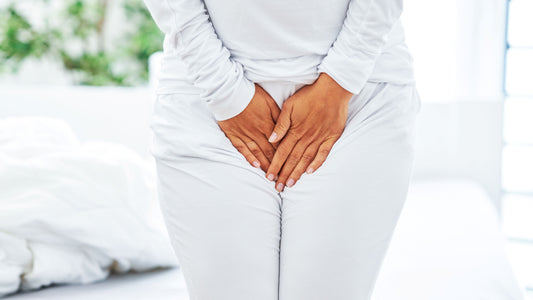Losing interest in sex during menopause can feel confusing, frustrating, and isolating.
If you’ve found yourself wondering, “Why don’t I want to have sex anymore?” you’re not alone. Many menopausal women experience a noticeable drop in libido, often due to hormonal shifts that impact both the body and mind. But understanding why these changes occur can help you take steps to regain confidence, intimacy, and pleasure.
In this article, you will learn:
How hormonal shifts during menopause affect libido
The role of estrogen, testosterone, and progesterone in sexual desire
Solutions and strategies to improve intimacy and sexual wellness
Let’s explore the connection between hormones and libido and what you can do about it.


Menopause is a time of profound hormonal shifts, and these changes have a direct impact on sexual desire and function. Three key hormones — estrogen, testosterone, and progesterone — play major roles in libido, and as their levels fluctuate, your body responds in ways that can decrease your interest in sex.
Estrogen: The Moisture and Sensitivity Hormone
Estrogen levels begin declining during perimenopause and drop significantly once menopause sets in. This hormone is essential for maintaining vaginal lubrication, blood flow, and the elasticity of vaginal tissues. When estrogen declines, women often experience:
Vaginal dryness and discomfort during sex.
Decreased sensitivity in the genital area.
Thinning of vaginal walls, leading to pain or irritation during intercourse.
For many women, these physical changes make sex less pleasurable or even painful, which naturally lowers the desire to engage in it.
Testosterone: The Drive And Desire Hormone
While testosterone is often associated with men, women also produce it — though in much smaller amounts. Testosterone contributes to sexual desire, arousal, and overall energy levels.
As menopause progresses, testosterone levels often drop, leading to:
Lower sexual desire and fantasy.
Decreased responsiveness to sexual stimulation.
Less spontaneous arousal or interest in intimacy.
Some women choose to supplement testosterone as part of hormone therapy, but options and effects vary. Be sure to read up on testosterone for menopause here.
Progesterone: The Calming And Mood-Regulating Hormone
Progesterone levels also decline sharply during perimenopause and menopause, which affects mood stability and sleep.
Since progesterone has a calming effect, its reduction can contribute to:
Increased anxiety and irritability.
Difficulty sleeping, leading to fatigue and low energy. When you’re tired, you don’t want to have sex.
Emotional fluctuations that impact sexual interest.
With these hormonal shifts working together, it’s no surprise that many menopausal women experience a significant decline in libido. But the good news is that solutions exist to help you reclaim your sexual well-being.
Physical And Emotional Effects Of Hormonal Changes
Hormonal changes during menopause don’t just affect sexual desire — they also bring physical and emotional challenges that can make intimacy feel less appealing. Many women experience discomfort, fatigue, and mood swings that make sex feel like a burden rather than a pleasure.

Physical Effects: When Sex Becomes Uncomfortable
One of the most common complaints among menopausal women is that sex no longer feels the same — or worse, it’s painful. This is largely due to the decline in estrogen, which leads to:
Vaginal dryness – Less natural lubrication can cause friction and discomfort during intercourse.
Thinning of vaginal walls – Less estrogen means less collagen, which leads to fragile, sensitive tissue.
Reduced blood flow to the genitals – This can lead to a decreased ability to feel pleasure and become aroused.

Physical Effects: When Sex Becomes Uncomfortable
One of the most common complaints among menopausal women is that sex no longer feels the same — or worse, it’s painful. This is largely due to the decline in estrogen, which leads to:
Vaginal dryness – Less natural lubrication can cause friction and discomfort during intercourse.
Thinning of vaginal walls – Less estrogen means less collagen, which leads to fragile, sensitive tissue.
Reduced blood flow to the genitals – This can lead to a decreased ability to feel pleasure and become aroused.
For some women, these physical changes are enough to make them avoid sex altogether. Even if the desire is there, the discomfort can override it.

Emotional Effects: When You Just Don’t Feel Like It
Beyond physical discomfort, menopause brings emotional changes that impact libido in unexpected ways. Fluctuating hormones influence mood, confidence, and energy levels, making it harder to feel sexually engaged.
Some common emotional and psychological effects include:
Mood swings and irritability – Progesterone and estrogen help regulate mood, so when they drop, you may feel more anxious or short-tempered. Not exactly a recipe for good sexual relations.
Fatigue and disrupted sleep – Hot flashes and night sweats can keep you up at night, leaving you exhausted and uninterested in intimacy.
Body image changes – Weight gain, sagging skin, or changes in breast shape can make some women feel less attractive, reducing sexual confidence.
Even if you still love and desire your partner, these shifts in how you feel physically and emotionally can create a disconnect between wanting sex and actually engaging in it.
But let’s keep talking about this because there are steps you can take to address these issues and improve your experience with intimacy during menopause.

Emotional Effects: When You Just Don’t Feel Like It
Beyond physical discomfort, menopause brings emotional changes that impact libido in unexpected ways. Fluctuating hormones influence mood, confidence, and energy levels, making it harder to feel sexually engaged.
Some common emotional and psychological effects include:
Mood swings and irritability – Progesterone and estrogen help regulate mood, so when they drop, you may feel more anxious or short-tempered. Not exactly a recipe for good sexual relations.
Fatigue and disrupted sleep – Hot flashes and night sweats can keep you up at night, leaving you exhausted and uninterested in intimacy.
Body image changes – Weight gain, sagging skin, or changes in breast shape can make some women feel less attractive, reducing sexual confidence.
Even if you still love and desire your partner, these shifts in how you feel physically and emotionally can create a disconnect between wanting sex and actually engaging in it.
But let’s keep talking about this because there are steps you can take to address these issues and improve your experience with intimacy during menopause.
What You Can Do To Improve Your Libido
Experiencing a decline in sexual desire during menopause can feel discouraging, but the good news is that there are steps you can take to improve your libido and overall intimacy.
By addressing hormonal imbalances, making lifestyle adjustments, and exploring different intimacy-enhancing strategies, you can rediscover pleasure and connection.
Since hormonal shifts are usually at the core of menopausal libido changes, hormone therapy can be an effective way to restore balance.
DHEA (Dehydroepiandrosterone) — A “building block” hormone, DHEA gets turned into other hormones by your body. It’s a key ingredient in Julva.
Estrogen Therapy – Available in pills, patches, creams, and vaginal rings, estrogen therapy could help combat vaginal dryness, increase blood flow, and possibly improve arousal.
Testosterone Therapy – Though somewhat controversial, some doctors prescribe small doses of testosterone to boost sexual desire. Full disclosure: this usually involves having a pellet surgically implanted into your rear.
Bioidentical Hormone Therapy (BHRT) – A more natural alternative for some women, BHRT aims to restore hormonal balance using plant-based hormones that are the same as what your body produces rather than synthetic hormones.
Hormone therapy isn’t right for everyone, so discussing risks and benefits with your doctor is crucial.


What you do outside the bedroom plays a significant role in how you feel inside it. Simple lifestyle adjustments can have a big impact on your energy, mood, and desire for intimacy.
Regular exercise – Boosts circulation, supports hormone balance and enhances confidence.
Balanced diet – Foods full of healthy fats, protein, and phytoestrogens may support hormonal health. Don’t forget, your body needs cholesterol to make hormones, so now is a great time to make sure you’re getting enough in your diet. And if you’re looking for extra hormone-balancing support , you might love Mighty Maca Plus —a powerful blend of 30+ superfoods and adaptogens designed to help with energy, hormone balance, and overall well-being. It’s a simple addition to your daily routine that can help you feel more like yourself again. For a FREE 11-day hormone-balancing meal plan, be sure to check out my Keto-Green® jumpstart here.
Stress management – Chronic stress raises cortisol, which suppresses sexual desire. Yoga, meditation, and deep breathing can help.
Quality sleep – Addressing sleep disturbances caused by menopause can restore energy and make intimacy feel more appealing.

While you’re working on your hormones and dialing in your lifestyle changes, you can also take immediate steps to make intimacy more enjoyable.
Try vaginal lubricants and moisturizers – Natural lubricants can ease dryness and discomfort, while vaginal moisturizers provide longer-term relief. My Julva formula combines top-shelf vaginal moisturizers with DHEA for a complete solution.
Communicate openly with your partner – Talk about your needs, concerns, and desires to strengthen emotional intimacy.
Try different types of intimacy – If traditional intercourse feels challenging, explore other forms of pleasure, such as sensual touch or massage.
Consider sex therapy or counseling – A professional can help navigate emotional barriers to intimacy and rebuild sexual confidence.
By combining hormone support, healthy lifestyle choices, and open communication, many women find they can reignite their sexual desire — even after menopause. So don’t give up!
Other Reasons You May Not Want Sex Anymore
While hormonal changes are a major factor in menopausal libido loss, they aren’t the only reason why you may not feel interested in sex. Other emotional, psychological, and relational factors can also contribute to a lack of desire.
1. Relationship Dynamics
Your relationship plays a significant role in your sexual desire. Even if your hormones were perfectly balanced, relationship issues could still dampen your libido.
Some common challenges include:
Emotional distance – If you and your partner have grown apart emotionally, physical intimacy may not feel appealing.
Resentment or unresolved conflict – Lingering issues, whether big or small, can create barriers to intimacy.
Routine and boredom – Long-term relationships sometimes lose excitement, making sex feel like a chore rather than a source of pleasure.
Rebuilding intimacy outside of the bedroom, through communication, quality time, and shared experiences, can help reignite your connection. I teach you how to work through things in my Sexual CPR course.
2. Past Sexual Trauma Resurfacing
For some women, menopause triggers the resurfacing of past sexual trauma. Shifts in hormones, body changes, or reduced libido can bring up difficult memories that had previously been buried.
Feelings of vulnerability – Physical changes like vaginal dryness or pain during sex can mirror past traumatic experiences.
Increased anxiety or depression – Hormonal fluctuations can heighten emotional distress, making unresolved trauma harder to suppress.
Avoidance of intimacy – Some women unconsciously avoid sex because it reminds them of past negative experiences.
If past trauma is affecting your libido, working with a therapist specializing in sexual health or trauma can be incredibly helpful.
3. Mental Health and Stress
Mental well-being has a direct impact on sexual desire. Depression, anxiety, and chronic stress can lower libido by affecting mood, energy levels, and self-confidence.
Depression – Decreased motivation and pleasure in daily activities often extend to sex.
Anxiety – Worries about performance, body image, or relationship issues can make intimacy stressful rather than enjoyable.
Chronic stress – High cortisol levels suppress sex hormones, leading to low libido.
Addressing mental health through therapy, self-care, and stress-reducing activities can help restore balance.
4. Medications And Health Conditions
Certain medications and medical conditions can also impact libido. If your sex drive has declined suddenly, it’s worth reviewing your health history.
Common medications that lower libido:
Antidepressants (especially SSRIs)
Blood pressure medications
Hormonal birth control (some doctors prescribe this, even during menopause)
Certain painkillers or muscle relaxants
Health conditions that can affect desire:
Diabetes (affects circulation and nerve sensitivity)
Thyroid disorders (hormonal imbalances)
Autoimmune diseases (chronic pain and fatigue)
If you suspect a medication or health condition is impacting your libido, talk to your doctor about alternative treatments or adjustments.
Sexual desire is complex, and menopause is just one piece of the puzzle. By considering all possible factors — hormonal, emotional, psychological, and physical, you can take steps to regain intimacy and pleasure in a way that feels right for you.
Why Don’t I Want To Have Sex Anymore?
Losing interest in sex during menopause can feel frustrating, but you are not alone — and you are not powerless. Hormonal changes, particularly the decline of estrogen, testosterone, and progesterone, play a major role in decreasing libido, but other factors like relationship dynamics, past trauma, stress, and medications can also contribute.
The good news is that solutions exist. Hormone therapy, lifestyle changes, and intimacy-enhancing strategies can help restore desire, while addressing emotional and psychological barriers can provide a deeper sense of connection and fulfillment.
Menopause marks a new phase of life, but it doesn’t mean the end of intimacy or pleasure. By understanding the changes happening in your body and taking proactive steps, you can reclaim confidence in your sexuality and enjoy a fulfilling sex life on your terms.


















